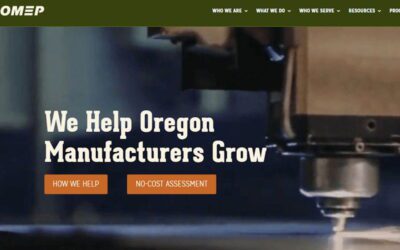This article originally appeared on Industry Week. Guest blog post by Linda Wechsler, senior consultant at OMEP. Paola Castaldo, managing consultant, and Russ Gaylor, manufacturing consultant, also contributed to this article.
How an Oregon components maker closed the gaps in its training and development program
A.R.E. Manufacturing Inc. is a family-owned contract machine shop located in Newberg, Oregon. What started out of a garage as a two-person business has grown into an established company with nearly 50 employees that specialize in the manufacture of machined components using high precision CNC equipment: vertical machining centers, horizontal machining centers with pallet systems and multi-axis lathes with live tooling.
Although the company had been steadily growing and adding employees, it continued to experience high turnover, especially among entry-level employees. A.R.E.’s leadership team knew this situation was not only impacting productivity, quality, and employee morale, but it was also preventing the company from building a talent pipeline to sustain the future of the business.
Training Gaps
After they talked with managers and other employees, it became clear that a gap existed in the company’s training and development program that was preventing up-and-coming employees from developing the skills and knowledge that could help them be more successful in their new roles.The leadership team needed to act quickly to reduce turnover before the impacts on the business worsened.
A.R.E. decided to contact us at the Oregon Manufacturing Extension Partnership (OMEP)—the official representative of the MEP National Network in Oregon—for assistance. A.R.E. had successfully partnered with us in 2005 for Continuous Improvement (lean) training and implementation support. A.R.E. president Alvin Elbert discussed the company’s ongoing turnover challenge with OMEP and its need for a training program that would help employees develop practical skills without causing too much downtime. We then collaborated with A.R.E. to create and implement a structured on-the-job training program called SMART Talent, while simultaneously refining the company’s hiring process.
High Impact Solutions
We first focused on entry-level skills for Level 1 Machinists, since this was the area with the biggest need and highest turnover. The training included areas such as basic machine operation, machine setup, understanding of tooling, basic measurement, and troubleshooting. Toward the end of the engagement, we shifted our focus from entry-level skills to more advanced skill development for Level 3 Machinists.
OMEP worked with A.R.E. to create training materials that focused on operating advanced machinery, engineering/design, computer numerical control (CNC) programming, advanced measurement, feeds and speeds, and advanced troubleshooting and dispositioning. We also started mapping out career pathways for Machinist Level 3 operators, which included a technical track and a management track and then developed methods for evaluating employee proficiency and performance across all levels. Over the course of four months, we refined the hiring process so that A.R.E. could be confident in their candidate selection.
We worked with A.R.E. to design interview questions that went beyond technical skills and would help the company find candidates that would fit A.R.E.’s culture.
Technical skills were easy to teach, but the most successful candidates would possess certain soft skills that were harder to train. The questions developed worked for entry-level candidates at any stage of life, from high school students looking for their first job to adults looking for a career change.
Meanwhile, SMART Talent provided training that quickly integrated new employees and helped develop existing employees. This cut turnover rates by more than 50% while increasing efficiencies.
“OMEP’s continued involvement is vital to our success and the development of manufacturing practices necessary to compete in the global economy,” said Elbert, adding that he also believes that
OMEP’s program is critical to the success of manufacturing in the State of Oregon. Domestic manufacturers provide living wage jobs and organizations such as OMEP are essential in keeping manufacturing alive and well in the U.S.
A Bright Future
A.R.E.’s journey is far from over. A.R.E. would like to integrate SMART Talent into its culture, which will standardize training procedures across products and processes as well as empower employees as they advance their careers at the company.
The payoff has been great for A.R.E., which since implementing the SMART Talent program has seen:
- 25% reduction in non-value-added activities due to standardization of current processes
- 30% increase in the entry-level hiring pool
- Projected 50% reduction in set-up time
- Projected 50% improvement in employee proficiency (reduction in training time from 5 years to 2.5 years)
Linda Wechsler is a Senior Consultant at OMEP. Paola Castaldo, Managing Consultant, and Russ Gaylor, manufacturing consultant, also contributed to this article.



